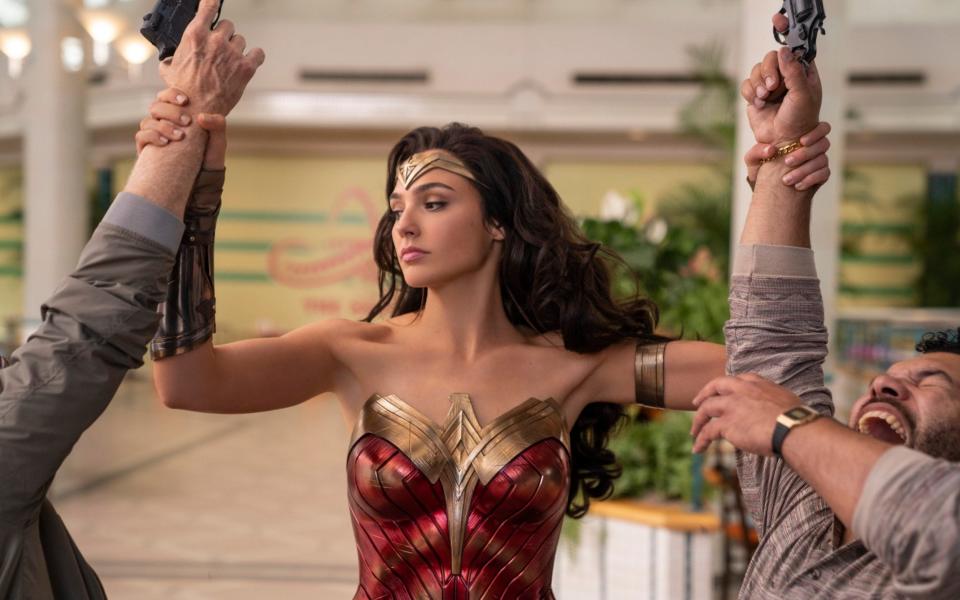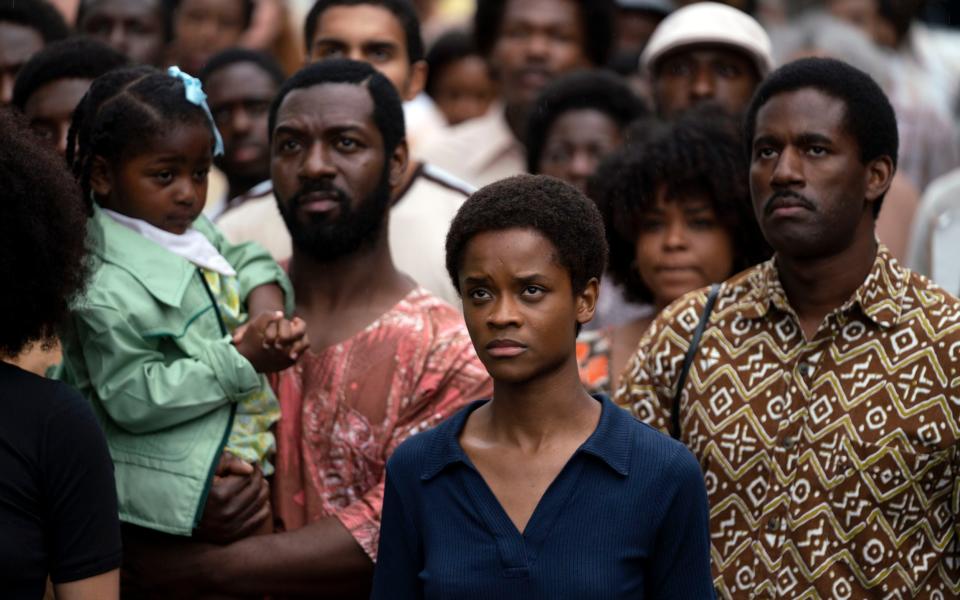2020 in film: the year that will change cinema forever

Which films made a splash in 2020? Frankly, I haven’t a clue. Or at least, none founded on the way the industry usually measures these things: by cold, hard box office takings. For almost five months of the calendar year, all 840 cinemas in the UK were closed. Many remained shut even when permitted to reopen thanks to the lack of new mass-market releases, as Hollywood battened down the hatches. In 2019, global box office revenue hit £31.67 billion: an all-time high, for which China and the Avengers can take the lion’s share of the credit. This year’s final haul is expected to reach a little over a third of that. In a world of bubbles, tiers and two-metre rules, customer demand was bound to shrivel.
But supply was also at a drought-like ebb, as studios pushed back almost every last one of their major films to 2021 in the absurd hope the good times would somehow return if they all just kept doing nothing for long enough. That fantasy persisted until last week, when Warner Bros acknowledged an uncomfortable truth that had already dawned on some of us a few weeks into the first lockdown. The short-term disruption brought by the pandemic to almost every aspect of cinema would render the industry’s current way of doing things not just temporarily unworkable, but obsolete.
The studio announced that all 17 of their 2021 releases, from Oscar hopefuls to a Space Jam sequel, would launch simultaneously in cinemas and on their new HBO Max streaming platform – in the United States, anyway. Internationally, they’ll open in cinemas a few weeks in advance. This will allow the studio to chart a course through the uncertain times ahead, keeping cinemas stocked and their own product moving while building a subscriber base for the new online arm of their business. (None of the films will make as much as they might have done in 2019, but they’ll be making something, and cinemas will too.)
Fearing a backlash from talent, whose contracts often include a cut of box-office returns, Warner Bros executed this new strategy like a dawn raid on the Bin Laden compound. Even major production companies were given only half an hour’s notice of the decision.

“Some of our industry’s biggest filmmakers and most important movie stars went to bed the night before thinking they were working for the greatest movie studio, and woke up to find out they were working for the worst streaming service,” said Christopher Nolan, Warner Bros’ most important director and a longstanding cinematic purist. To which anyone with an eye on the times might respond: at least they’re still working.
The most immediate consequence, though, was the demolition of the “theatrical window”, the 16-week period when films are made available only in cinemas to ensure high box office returns. Whatever Warner Bros might have said about single-year emergency measures, this particular window is not about to be reglazed. So after nine months of collective head-burying, the watershed moment finally arrived, and cinema will be forever changed by it.
The “available everywhere” model is, to coin a phrase, the new normal. And that means cinemas will have to explain to customers what they can offer beyond the latest releases. On a venue-by-venue basis, this will be painful, since those that can’t do so convincingly will very possibly close. But for the sector at large, it will also be healthy – and perhaps overdue. I mean, what did you miss most about actually visiting the cinema this year? (If you’ve read this far, I’m assuming you must have at least missed it a bit.)

Keeping up with the latest developments in the franchise or extended universe of your choice? Or – as I suspect – was it something less release-specific? For me, it was all of the following: having your sight and hearing and mind monopolised for a couple of hours; feeling a story alter the flow of energy in a roomful of strangers; experiencing that cognitive whirr as you step out into the foyer afterwards and start to process what you’ve just seen and heard.
When cinemas reopened this summer, I saw Christopher Nolan’s time-inverting spy thriller Tenet three times on the BFI Imax’s King Kong-sized screen. And while this might not sound like much of a compliment, one of my favourite parts always came around five minutes after it had ended, when I left the building, took off my mask, and saw the variously elated, stunned and bamboozled expressions on the faces of my fellow attendees.
This will never, ever happen in a living room, no matter how large your television may be. Yet in a largely living-room-bound year, films felt more important than ever, as our screens at home became escape hatches that took us to pandemic-free parallel worlds. (Or, alternatively, back to Steven Soderbergh’s 2011 virus thriller Contagion – pretty darn prescient, it turns out – which became a top-10 rental title back in March.)

In April, Universal bit the bullet and pushed their big Easter animation, Trolls World Tour, on to online rental services – the first sign that changes would be required for the industry to survive. Stir-crazy families fell on this multicoloured singalong adventure with profound gratitude, and within three weeks, it had made back its $90 million (£73 million) budget in rental fees.
Disney launched their Disney+ streaming platform in the UK in late March, then almost five months later announced that one of their 2020 crown-jewel blockbusters, the $200 million live-action remake of Mulan, would skip cinemas and premiere on the service instead, where it could be unlocked for a one-off £19.99 charge.
Like the Warner Bros bombshell, this move had been unthinkable right until the moment Disney made it – and compared to the film’s vast cost, the one-off revenue spike it generated presumably wasn’t enormous. (If it had been, one would imagine we would have been told.) But as the studio realised in their own mini-watershed moment, counting ticket sales is a very 2010s mindset.
In 2020, subscriptions became king, and almost one in five of the subscribers who paid for Mulan had joined to view it. At the end of its first year, Disney+ has 73.7 million subscribers – a number the service had originally hoped to reach in 2024. While most studios spent the year on pause, Disney leapt almost half a decade ahead. In doing so, they also made some enemies: the very cinemas who had been counting on Mulan (and also Pixar’s Soul, another high-profile Disney+ defector) to coax customers back through their doors.

James Bond was also the cause of much despair, since for most of the year No Time to Die had been held up as the film that would bring cinemagoers flocking back before Christmas. Then in October, it scuttled off to next April – though in light of Warner Bros’ recent move, a dual theatrical-online release is surely now being considered.
At this point, Netflix could be forgiven for feeling smug. All of 2020’s most seismic happenings in cinema have been standard policy at the streaming giant for years, from the slender theatrical windows – usually two weeks tops, which is why the multiplex chains never book their films – to the focus on attracting and satisfying subscribers rather than maximising the number of times any given film is watched. When Covid began wreaking havoc, Netflix did not appear to change their release plans one iota – perhaps uniquely in the entire film business. If cinemas were open and able to play their wares, all well and good; if they weren’t, they went on to the service regardless.
When it became clear in May that the autumn festival season was going to be fraught with uncertainty, Netflix decided to ditch the whole thing – though in the end Venice and San Sebastián went ahead, and both heroically passed without a single viral outbreak. Netflix’s late-2020 releases included a number of what should have been festival no-brainers: David Fincher’s velvety Hollywood backstage noir Mank; Charlie Kaufman’s phantasmagorical break-up drama I’m Thinking of Ending Things; Aaron Sorkin’s good old-fashioned gavel-banger The Trial of the Chicago 7.

It was also Netflix that distributed the very best film of 2020, Josh and Benny Safdie’s Uncut Gems. Perhaps in an unwitting taster of the world to come, I saw this tense comic thriller in the cinema in January the old-fashioned way, projected from a blazingly vivid 35mm print, then again the following week at home on the sofa, streamed in HD. In November and December, Steve McQueen’s Small Axe anthology was a cinematic milestone that just happened to be broadcast on BBC One.
The Best Picture-winning Parasite broke the UK box office record for a foreign-language film in February and March, then became a lockdown rental staple on the Curzon Home Cinema service in the months after that. One of the finest British features in years, Sarah Gavron’s Rocks, opened in cinemas in mid-September and was also on Netflix by the end of the same month. This boundlessly warm and witty coming-of-age drama was more than worth leaving the house for. But having the option to see it without going anywhere was nice too.
This year we’ve watched as cinemas have been transformed from the only way to watch new films into the optimum one – theoretically, at least. Their survival over the next 12 months will depend on them being up to that task.

